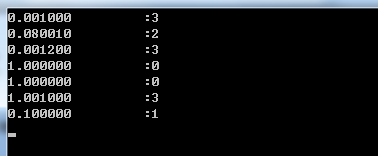有这样一个问题:需要知道浮点数从小数点后,开始非零数字的起始位置。比如:1.05,非零位置就是2;0.004200,非零位置就是3。具体效果如下图:

代码:
#include <iostream>
#include <iomanip>
#include <stdio.h>
using namespace std;
int getDoubleAccuracy(double d)
{
char chArr[100] = "";
int iIndex = 0;
int iPos = 1;
int iLen = sprintf(chArr, "%lf", d);
// 检索小数点位置
for (; iIndex < iLen && '�' != chArr[iIndex]; ++iIndex)
{
if ('.' == chArr[iIndex])
{
++iIndex;
break;
}
}
// 检索小数点到有效位数之间的长度
for (; iIndex < iLen && '�' != chArr[iIndex]; ++iIndex)
{
if ('0' != chArr[iIndex])
{
return iPos;
}
else if (1 != iPos && '�' == chArr[iIndex])
{
return 0;
}
else
{
++iPos;
}
}
return 0;
}
int main(int argc, char *argv[])
{
double d = 0.001;
cout.setf(ios::fixed);
cout.precision(6);
cout << d << " :" << getDoubleAccuracy(d) << endl;
d = 0.08001;
cout << d << " :" << getDoubleAccuracy(d) << endl;
d = 0.00120;
cout << d << " :" << getDoubleAccuracy(d) << endl;
d = 1.00;
cout << d << " :" << getDoubleAccuracy(d) << endl;
d = 1;
cout << d << " :" << getDoubleAccuracy(d) << endl;
d = 1.0010;
cout << d << " :" << getDoubleAccuracy(d) << endl;
d = 0.10;
cout << d << " :" << getDoubleAccuracy(d) << endl;
getchar();
return 0;
}